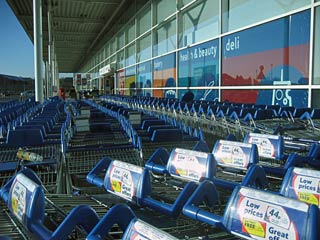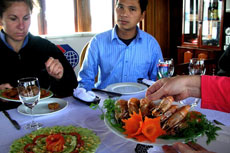Human Flower Project
Monday, February 05, 2007
Giant Cuts Back on Kenya’s Cut Flowers
The U.K.‘s retailing behemoth plans to trim its imports, and African flower sellers are reeling at the news.
 Flowers at Tesco superstore
Flowers at Tesco superstore
Newmarket Rd.
Cambridge, England
Photo (detail): John Levett
Tesco is to the U.K. what Wal-Mart is to the USA, the place to buy everything but a tooth extraction. The giant retailer recently lowered the boom on foreign suppliers of cut flowers, announcing that it would be importing less than 1% of its merchandise. Tesco has been importing 2-3% of what it sells.
Outcry came immediately from traders in sub-Saharan Africa. Kenya now sends 23% of its exports to the U.K., primarily “strawberries, green beans and a wide variety of flowers.” And those exports have been on the rise.
Who knows what Tesco’s real motivations are? probably a mix of cost-saving and face-saving. The company says its goal is ecological: to reduce its “carbon ‘footprint,’ recycle more, cut packaging and reduce airfreight.” Great Britain’s other three major supermarkets are moving in the same direction; all have been criticized for the high environmental price of all those freight planes.
Tesco does 80% of its business in the U.K., with 1779 stores and “over 250,000” employees.” Our correspondent in Cambridge, John Levett braved one of the superstores to take a few flower photos “before being politely asked to leave!” he tells us. “Must have been the flack jacket & fatigues that alerted management!”
 Cambridge’s Newmarket Rd. Tesco store
Cambridge’s Newmarket Rd. Tesco store
Photo: John Levett
Even before being ushered out with his camera, John—a photographer, writer, gardener, and cook—didn’t think too highly of the place. He wrote us, “My take on Tesco basically applies to all supermarkets. On both the supply & demand side they squeeze out local producers, standardize everything, demand excessive packaging, dominate Third World producers, mask ingredients, market tasteless fruit & veg, charge premium prices for products distinguished by their presentation alone, exploit children, take little heed of nutritional research,” (don’t hold back now, John), “buy prime land & sit on it until planning permission is granted by cash-strapped local councils, create transport bottlenecks surrounding in-town/edge-of-town locations, generate environmental problems surrounding out-of-town locations, create their own pricing policies for suppliers thus affecting wage levels detrimentally for low wage/non-unionised (often immigrant) labour, create environmental damage by shipping-in practices,” (on point for this post) “adhere often in word only to guidelines on sustainability in developing countries…etc. “
 Photo: ‘Camo’ John Levett
Photo: ‘Camo’ John Levett
Since he stopped shoping there, only “snapping,” he writes, “my food bill has fallen by 25%, I cook more, I buy more fresh fruit & veg from local markets, I think more about what I eat, I rarely buy packaged/processed meals (gotta have a crap meal sometime!), I’m less stressed in shopping, not having to negotiate aisles/listen to piped music/queue/respond to bland manager-initiated greetings at the checkout/increase my alienation from organic society & the unity of humanity with the natural world (or something like that).”
Many thanks, John, for sending these pictures and for boiling over and down the problems with big-box merchandizers.
What gets sticky, though, is that these realities mean very little to most people in Africa. The Kenya Flower Council is just wondering what it’s going to do with all the roses and gerberas now cooking under the African sun.
Another break between African flower producers and European flower consumers widened this week in Germany. Reportedly “millions of dollars worth” of blooms from Zimbabwe were banned and sent back south because their packaging didn’t meet German environmental standards.
Europe’s heightened environmental concerns don’t seem to square with the problems or outlooks of more newly-industrialized nations. According to reporters Paul Redfern, and Wachira Kang, “The per capita contribution of pollution by Europe is more than 22 per cent to Africa’s 1.2 per cent.” Just so, Jane Ngige, an official of the Kenyan Flower Council, dismissed the environmental costs of flying flower-laden planes to England. “If you look at the proportion of our contribution to ozone layer depletion,” she said, “it’s nothing compared to that of Europe.”
Culture & Society • Cut-Flower Trade • Ecology • Politics • Permalink




